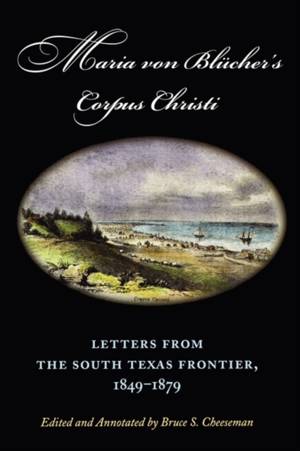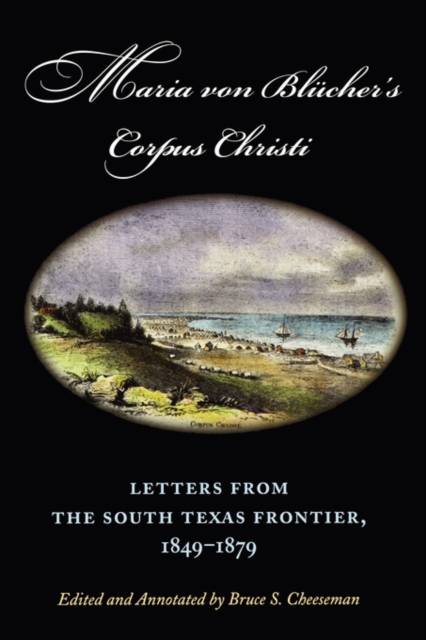
- Retrait gratuit dans votre magasin Club
- 7.000.000 titres dans notre catalogue
- Payer en toute sécurité
- Toujours un magasin près de chez vous
- Retrait gratuit dans votre magasin Club
- 7.000.0000 titres dans notre catalogue
- Payer en toute sécurité
- Toujours un magasin près de chez vous
Maria Von Blucher's Corpus Christi
Letters from the South Texas Frontier, 1849-1879
Maria Augusta Von Blucher
37,45 €
+ 74 points
Description
In 1849, a young German bride and her husband stepped off a ship in Corpus Christi Bay to establish their home in the new frontier settlement. For the next three decades Maria von Blücher wrote letters home describing the hardships of droughts and Indian and bandit raids, the chaos of the American Civil War, the discomforts of pioneer living, the joys and heartbreaks of family life, and the development of a town that her descendants would help to build into a thriving city. Her letters record above all the woman's side of pioneer life. Although they offer insight into political events and economic developments in Germany, the United States, and South Texas, their greater value lies in the picture they paint of the deprivations, cruel hardships, sacrifice, and dangers faced in everyday life. Maria's letters stand as a personal account of the pioneer experience and an elegant testimony to the role played by Germans in the settlement of South Texas. They provide an intimate look inside the homes and ranches, the schools and farmyards, the stores and churches of early Corpus Christi. They examine families and friendships, communities, congregations, and social unions. In Maria von Blücher's Corpus Christi Bruce S. Cheeseman has edited and annotated more than two hundred of the nine hundred letters that are held in the von Blücher family's papers on deposit at the Special Collections and Archives of the Mary and Jeff Bell Library at Texas A&M University-Corpus Christi. In her life and in her letters, Maria von Blücher joined all of the courageous pioneer women who helped to lay the foundations of Texas communities. These letters unerringly draw a Texas landscape that is gone forever. BRUCE S. CHEESEMAN is former director of the Museum of the Gulf Coast in Port Arthur. What Readers Are Saying: "Maria is made of stern stuff. There are enough twists, turns and reversals of fortune to make an epic. It isn't too often that nonfiction stories are made into films, but this one ought to be."--The Dallas Morning News "A touching, personal narrative that takes the reader deep into the joys, frustrations, tribulations, and triumphs of pioneer life, Maria von Blucher's Corpus Christi is a superbly presented and highly recommended contribution to Pioneer Studies and Texas History supplemental reading lists and reference collections." --The Midwest Book Review "With this book, Canales said, Cheeseman has given readers' a timely, rare glimpse of Corpus Christi's rough-and-tumble beginnings."--Corpus Christi Caller Times "This is a fascinating book. Maria von Blucher's letters are highly informative reading for anyone who is interested in learning about the daily life of a woman and her family in nineteenth-century Texas, particularly from a German perspective. Maria von Blucher's correspondence can also be viewed as one of the earliest examples of writing produced by a women who wrote in the German language in Texas. Maria von Blucher's edited correspondence is a book well worth reading and rereading, and I highly recommend it to anyone interested in the story of the German experience in Texas."--German-Texan Heritage Society "Maria's letters add a new voice to story of German Texas immigrants. In addition to being valuable sources of social history, the letters also document the process of language loss and acculturation on the frontier. Letters. . .is a well-organized, beautifully illustrated resource. Bruce Cheeseman selected passages that create a compelling psychological drama in a rich historical setting in an eventful era."--East Texas State Historical Association
Spécifications
Parties prenantes
- Auteur(s) :
- Editeur:
Contenu
- Nombre de pages :
- 320
- Langue:
- Anglais
- Collection :
- Tome:
- n° 5
Caractéristiques
- EAN:
- 9781603442237
- Date de parution :
- 28-07-10
- Format:
- Livre broché
- Format numérique:
- Trade paperback (VS)
- Dimensions :
- 153 mm x 229 mm
- Poids :
- 476 g

Les avis
Nous publions uniquement les avis qui respectent les conditions requises. Consultez nos conditions pour les avis.






